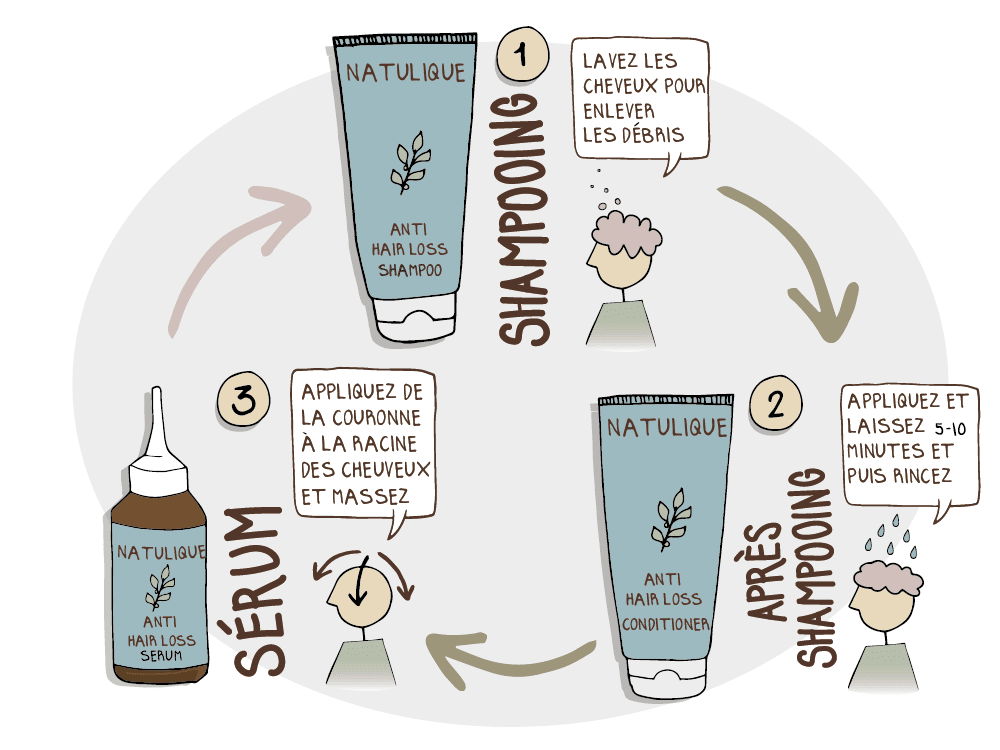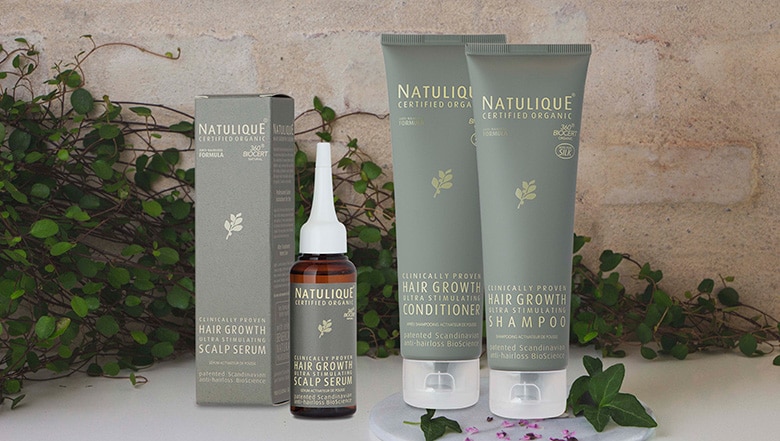Understanding the importance of a good shampoo
Choosing the right shampoo is essential for maintaining the health of your hair and scalp. The right shampoo can improve your hair's texture, make it shinier and prevent various hair problems. Conversely, the wrong choice of shampoo can cause irreparable damage. In this first part, we'll explore the importance and dangers of using shampoo.
The role of shampoo
Cleaning hair
The main role of a shampoo is to clean your hair. It removes dirt, excess sebum and styling product residues. A good shampoo must be able to clean effectively without stripping the hair of its necessary natural oils.
Scalp protection
A good shampoo doesn't just clean; it also protects the scalp. Certain ingredients in shampoos, such as aloe vera and panthenol, help soothe and moisturize the scalp, preventing irritation and itching.
Hair revitalization
A quality shampoo also helps to revitalize hair. Vitamins and minerals can nourish hair from roots to ends, making it stronger and more resistant to damage. This is particularly crucial for those who regularly use heated styling tools or chemicals.
The dangers of the wrong shampoo
Effects on hair health
The wrong choice of shampoo can wreak havoc on your hair's health. Harsh ingredients like sodium lauryl sulfate can dry out hair and make it brittle. What's more, harmful ingredients can also cause allergic reactions or inflammation.
Effects on the scalp
The scalp is an extension of the facial skin, and requires special care. Inappropriate shampooing can lead to itching, dandruff and even more serious conditions such as eczema or psoriasis. Using a product with irritating ingredients can aggravate these conditions.
How to identify your hair type
Different hair types
Dry hair
Dry hair lacks moisture, which often makes it rough to the touch and prone to breakage. It can also appear dull and lack shine. People with dry hair often notice split ends and frizzy strands. This type of hair requires special care, including moisturizing products.
Greasy hair
Greasy hair is characterized by excessive sebum production. It can appear flat, heavy and lacking in volume the day after washing. Roots quickly become greasy, and frequent washing may be necessary. This type of hair requires a shampoo that regulates sebum production.
Normal hair
Normal hair is balanced in terms of moisture and sebum production. It is neither too dry nor too greasy, and retains its volume and shine naturally. This type of hair is the easiest to maintain, as it requires no specific care except to maintain this natural balance.
Combination hair
Combination hair has both dry and oily characteristics. In general, the roots are oily while the ends are dry. This type of hair can pose a particular challenge, requiring a balanced treatment to control excess sebum at the roots while moisturizing the ends.
The impact of hair type on shampoo choice
Shampoo for dry hair
For dry hair, hydration is key. Look for shampoos formulated with moisturizing ingredients like coconut oil, argan or aloe vera. These ingredients help to deeply nourish hair while providing the necessary moisture. Avoid products containing sulfates, which can further dry out your hair.
Shampoo for oily hair
If you have oily hair, it's crucial to choose a shampoo that regulates sebum production without completely eliminating the necessary natural oils. Opt for shampoos with ingredients such as lemon or green tea extract, which have astringent properties. Avoid oily or overly rich formulas.
Shampoo for normal hair
Normal hair needs a balanced shampoo that maintains its neutral state. A mild shampoo with a light formula is usually sufficient. Look for natural ingredients like chamomile or keratin that help maintain overall hair health without causing imbalance.
Shampoo for combination hair
For combination hair, it's often advisable to use a specific shampoo for this type of hair, or to combine different products. Opt for a balancing shampoo that treats oily roots and nourishes dry ends. Ingredients such as clay or lavender can help regulate sebum while providing the necessary moisture.
Understanding your hair type is the crucial first step to choosing the right shampoo. Taking the time to identify your hair's specific needs will ensure you make an informed choice. The right products will help maintain your hair's natural health and beauty.
See also: How to curl your hair quickly?
Ingredients to choose and avoid
Beneficial ingredients for hair
Proteins
Proteins are essential components for strengthening and repairing hair. Keratin, for example, is a protein naturally present in hair that helps make it more resistant to breakage. Adding keratin to shampoos helps revitalize and repair damaged hair. Silk and wheat proteins are also beneficial, bringing softness and shine to hair.
Natural oils
Natural oils, such as argan oil, coconut oil and olive oil, are rich in nourishing fatty acids and vitamins. They deeply moisturize, add shine and soften hair without weighing it down. These oils are particularly beneficial for dry, damaged hair. What's more, they have antioxidant properties that protect hair from environmental damage.
Ingredients to avoid
Sulfates
Sulfates, such as sodium lauryl sulfate and sodium laureth sulfate, are popular cleansing agents in shampoos for their ability to produce abundant lather. However, they can be very harsh on hair and scalp. They remove the natural oils needed for hydration, leaving hair dry and prone to breakage. Avoiding sulfates is particularly crucial for people with color-treated or chemically-treated hair.
Parabens
Parabens are used as preservatives in many hair care products to extend their shelf life. However, they are known to disrupt the endocrine system and may be linked to more serious health problems. Opting for paraben-free shampoos is a safer choice for those seeking more natural, less toxic products.
Silicones
Silicones, often added to shampoos to give a smooth, shiny appearance, can actually cause long-term problems. They form a layer on hair that can weigh it down and block moisture. What's more, they're difficult to remove and can lead to a build-up of residue that makes hair look dull and lifeless. Opt for silicone-free shampoos if you want to avoid these inconveniences.
By choosing shampoos with beneficial ingredients and avoiding harmful ones, you can significantly improve the health and appearance of your hair. Proteins and natural oils are valuable allies, while sulfates, parabens and silicones should be avoided to preserve your hair's vitality.
Criteria for choosing the right shampoo
Shampoo composition
pH balance
An often overlooked but crucial criterion is the pH of the shampoo. A balanced pH (between 4.5 and 5.5) is ideal, as it corresponds to the natural pH of the scalp. This maintains a healthy environment for hair growth, while reducing irritation and dryness. An unsuitable pH can unbalance the scalp, causing problems such as excessive sebum production or dryness.
Organic and natural ingredients
Choose shampoos containing organic and natural ingredients. Not only are these ingredients generally gentler on hair and scalp, they're also more environmentally friendly. Ingredients such as aloe vera, honey and essential oils offer a range of benefits without the risks associated with synthetic ingredients.
Moisturizing and nourishing agents
Ingredients such as glycerine, panthenol and plant extracts play a key role in moisturizing and nourishing hair. These moisturizing agents help maintain hair's natural moisture, making it softer and more manageable. They are particularly beneficial for dry or damaged hair.
Aspects to consider depending on your lifestyle
Washing frequency
If you wash your hair frequently, it's important to choose a gentle shampoo that won't dehydrate the hair. A daily shampoo should contain light cleansing agents and soothing ingredients to avoid long-term damage. Conversely, if you wash your hair less frequently, a more nourishing shampoo may be more appropriate.
Weather conditions
Climate can also influence your choice of shampoo. In winter, when the air is dry, a moisturizing shampoo is crucial to avoid dry, brittle hair. In summer, a shampoo with UV filters can protect against sun damage. Adapting your choice of shampoo to climatic conditions can greatly improve the health of your hair.
Respect for the environment and ethics
Eco-friendly and cruelty-free products
More and more consumers are looking for eco-friendly products that are not tested on animals. Choosing a shampoo labeled "eco-friendly" and "cruelty-free" not only reduces your ecological footprint, but also supports ethical practices. These products are often formulated without toxic ingredients and with recyclable packaging to minimize environmental impact.
Certifications and quality labels
Check for certifications and quality labels when choosing a shampoo. Labels such as ECOCERT, COSMOS or NATRUE guarantee that the product complies with strict standards in terms of composition, production and environmental impact. Opting for certified shampoos ensures superior quality and transparency about the ingredients used.
FAQ
How often should I wash my hair?
The ideal washing frequency depends on your hair type and lifestyle. In general, washing hair two to three times a week is sufficient for most hair types.
Are sulfate-free shampoos really better?
Yes, sulfate-free shampoos are often better, as they are less aggressive and preserve the hair's natural oils, preventing it from drying out.
How do I know if a shampoo is right for me?
Read labels carefully and choose a shampoo suited to your hair type. Also pay attention to ingredients and avoid those known to cause irritation or allergies.
Are organic shampoos really more effective?
Organic shampoos may be more effective for some people, as they contain more natural ingredients.





